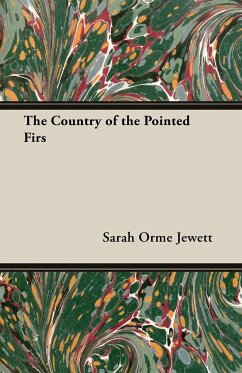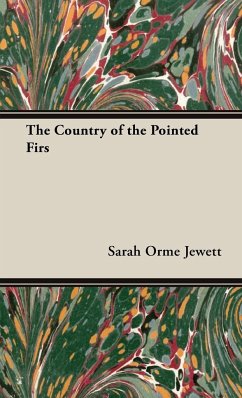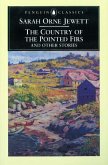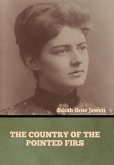Sarah Orne Jewett
The Country of the Pointed Firs and Other Stories
22,99 €
inkl. MwSt.
Versandfertig in 1-2 Wochen

11 °P sammeln
Sarah Orne Jewett
The Country of the Pointed Firs and Other Stories
- Broschiertes Buch
- Merkliste
- Auf die Merkliste
- Bewerten Bewerten
- Teilen
- Produkt teilen
- Produkterinnerung
- Produkterinnerung
The story of an endearing, unlikely friendship set against the backdrop of a remote and beautiful Maine coastal town, The Country of the Pointed Firs is one of Sarah Orne Jewett's most loved works, and it quickly earned her a reputation as a talented writer upon its publication. Praised by Alice Brown for its "idyllic atmosphere of country life," Jewett's moving novel shows her intimate understanding of New England and its unique inhabitants, whose prickly exteriors often concealed a warm and loyal nature. This Modern Library Paperback Classics edition includes four additional Dunnet Landing…mehr
Andere Kunden interessierten sich auch für
![The Country of the Pointed Firs The Country of the Pointed Firs]() Sarah Orne JewettThe Country of the Pointed Firs11,99 €
Sarah Orne JewettThe Country of the Pointed Firs11,99 €![The Country of the Pointed Firs The Country of the Pointed Firs]() Sarah Orme JewettThe Country of the Pointed Firs38,99 €
Sarah Orme JewettThe Country of the Pointed Firs38,99 €![The Country of the Pointed Firs The Country of the Pointed Firs]() Sarah Orme JewettThe Country of the Pointed Firs42,99 €
Sarah Orme JewettThe Country of the Pointed Firs42,99 €![The Country of the Pointed Firs and Other Stories The Country of the Pointed Firs and Other Stories]() Sarah O. JewettThe Country of the Pointed Firs and Other Stories14,99 €
Sarah O. JewettThe Country of the Pointed Firs and Other Stories14,99 €![The Country Of The Pointed Firs The Country Of The Pointed Firs]() Sarah Orne JewettThe Country Of The Pointed Firs35,99 €
Sarah Orne JewettThe Country Of The Pointed Firs35,99 €![The Country of the Pointed Firs The Country of the Pointed Firs]() Sarah Orne JewettThe Country of the Pointed Firs29,99 €
Sarah Orne JewettThe Country of the Pointed Firs29,99 €![The Country Of The Pointed Firs The Country Of The Pointed Firs]() Sarah Orne JewettThe Country Of The Pointed Firs18,99 €
Sarah Orne JewettThe Country Of The Pointed Firs18,99 €-
-
-
The story of an endearing, unlikely friendship set against the backdrop of a remote and beautiful Maine coastal town, The Country of the Pointed Firs is one of Sarah Orne Jewett's most loved works, and it quickly earned her a reputation as a talented writer upon its publication. Praised by Alice Brown for its "idyllic atmosphere of country life," Jewett's moving novel shows her intimate understanding of New England and its unique inhabitants, whose prickly exteriors often concealed a warm and loyal nature. This Modern Library Paperback Classics edition includes four additional Dunnet Landing stories: "The Queen's Twin," "A Dunnet Shepherdess," "The Foreigner," and "William's Wedding."
Hinweis: Dieser Artikel kann nur an eine deutsche Lieferadresse ausgeliefert werden.
Hinweis: Dieser Artikel kann nur an eine deutsche Lieferadresse ausgeliefert werden.
Produktdetails
- Produktdetails
- Verlag: Penguin Random House LLC (No Starch)
- Seitenzahl: 304
- Erscheinungstermin: 9. Januar 2001
- Englisch
- Abmessung: 203mm x 132mm x 16mm
- Gewicht: 341g
- ISBN-13: 9780375756719
- ISBN-10: 037575671X
- Artikelnr.: 22460511
- Herstellerkennzeichnung
- Libri GmbH
- Europaallee 1
- 36244 Bad Hersfeld
- gpsr@libri.de
- Verlag: Penguin Random House LLC (No Starch)
- Seitenzahl: 304
- Erscheinungstermin: 9. Januar 2001
- Englisch
- Abmessung: 203mm x 132mm x 16mm
- Gewicht: 341g
- ISBN-13: 9780375756719
- ISBN-10: 037575671X
- Artikelnr.: 22460511
- Herstellerkennzeichnung
- Libri GmbH
- Europaallee 1
- 36244 Bad Hersfeld
- gpsr@libri.de
Theodora Sarah Orne Jewett was born on September 3, 1849 to Caroline Frances Perry and Dr. Theodore Herman Jewett. Her father, a physician, was the son of a prosperous merchant in South Berwick, Maine, a shipbuilding and manufacturing town upriver from Portsmouth, New Hampshire. Her childhood was a comfortable one, rich in the cultural and educational activities of a thriving New England town. But Sarah, as she was known, was considered a sickly child, and her father often took her on his rounds to visit patients, bringing her into contact with other rural New Englanders whose experiences and circumstances were quite different from her own. She credited her father's keen eye for natural detail—as well as human nature and its foibles— her first schooling in the art of observation. With her elder sister, Mary, and her younger sister, Caroline, Sarah attended local schools, finishing at Berwick Academy (1861-66), her father's alma mater. In her creative writing Jewett began with short stories, first publishing 'Jenny Garrow's Lovers' in 1868 in the periodical The Flag of Our Union under the pseudonym A. C. Eliot. Though pleased by this first publication, Jewett knew she had yet to break into the real literary market. The third story she submitted to The Atlantic Monthly magazine was at last accepted by assistant editor William Dean Howells; it appeared in 1869 under the title 'Mr. Bruce' with the same pseudonym. So began a lifelong association with Howells and his successors as editors of the Atlantic, Thomas Bailey Aldrich and Horace Scudder, relationships that would help Jewett develop as a writer. In the early 1870s Jewett was freed from financial concerns by a small legacy from her paternal grandfather. She began a peripatetic life, traveling to Cambridge and Boston where she met the literary stars of her era, including John Greenleaf Whittier, Howells, Aldrich, and the book publisher James T. Fields and his wife, Annie, herself a writer and translator. All the while, Jewett was reading works of contemporary European writers such as Gustave Flaubert and George Sand, as well as New England authors like Louisa May Alcott, Elizabeth Stuart Phelps, and Harriet Beecher Stowe—whose Maine novel, Pearl of Orr' Island, Jewett had first read as a young girl and about which she later claimed it gave her 'to see with new eyes and to follow eagerly the old shore where genius pointed the way.' In September 1873 the Atlantic published 'The Shore House,' the first of a group of stories set in a fictional Maine seaport and the beginning of the collection that was published in April 1877 as her first full length book, Deephaven. A second collection of seven stories, Old Friends and New, was published in 1879, followed in 1881 by Country By-Ways, a book of nine pieces. That same year, upon the death of James T. Fields, Sarah came to visit his widow, Annie, and stayed to spend part of the year at her house on Charles Street in Boston. Thus began the pattern of annual visits in which Sarah would live and travel with Annie in between periods at home in South Berwick. This relationship would become the most important one in Sarah's life. Over the next decade or so, she published five new collections of stories that contain some of her finest short fiction, especially A White Heron and Other Stories (1886). She also wrote works for children, such as Betty Leicester (1890); two novels, A Country Doctor (1884) and A Marsh Island (1885); and a semiautobiographical book about her father. Annie and Sarah took four trips to Europe together in 1882, 1892, 1898, and 1900, visiting such luminaries as the Dickens family, Tennyson, Mrs. Humphry Ward, Henry James, and Rudyard Kipling. But their trips throughout New England had the greatest influence upon Jewett's work. During the long summer months, either together with Annie Fields, her sister Mary, or by herself, Jewett visited friends along the coast from Manchester-by-the Sea, out to the Isle of Shoals, down into Maine to Boothbay Harbor, Islesboro, and other parts of Penobscot Bay. These travels not only satisfied her apparent love of good conversation and new experiences but, in at least one instance, actually helped frame her most important work, The Country of the Pointed Firs., In July 1895, Jewett spent a long weekend at the summer home of T. B. Aldrich and his wife, Lilian, to see for herself the place Aldrich had described to all his friends as 'magical' and 'unlike anything else he'd known.' His house, called The Crags, was located on the St. George peninsula at the western edge of Penobscot Bay. It was a backwater place not yet fully discovered by tourists or rusticators—the wealthy visitors who descended upon coastal Maine towns for several months each summer. So well did Jewett enjoy her visit that she returned to the area two months later to rent a cottage in the hamlet of Martinsville, where she, Annie Fields, two maids from their Boston household, and later Mary Jewett, settled into the rustic life for a month. In Sarah's letters from this period, written to her sister and to several friends, she describes a lazy summer vacation, including in her descriptions small, clever portraits of local people and local life. Jewett would later tell Henry James that she did 'not exactly [visit] the locality' where she set Pointed Firs before writing the book. She was often cagey about the sources and inspiration for her work. However, the timing of the first installment of the book's publication in the January 1896 issue of the Atlantic lends some proof to more recent assertions that Dunnet Landing was—if not based on Martinsville itself—a creation of Jewett's that had its source in Aldrich's 'omagical' St. George peninsula. Ironically, from the book's publication onward, there has been a general assumption from critics and local St. George inhabitants alike, that the events in Pointed Firs actually happened to Jewett, right down to the rental of a schoolhouse in which it is said she tried to write. Such inaccurate conjectures have not only belied Jewett's artistry but may also have contributed to the postwar, critical dismissal of Pointed Firs as merely another collection of stories in the minor 'local color' genre. The first seven chapters of The Country of the Pointed Firs appeared in the Atlantic in January 1896, Chapters VIII through XI in March, Chapters XII through XV in July, and Chapters XVI through XIX in September. When these were published in book form in November 1896 by Houghton Mifflin, Jewett added two final chapters 'Along Shore,' and 'The Backward View' which, in addition to containing some of her loveliest writing, also clearly ended the book and brought to a fitting close the summer idyll of the young writer-narrator. The book was an immediate success and went into numerous printings and subsequent editions. Surprisingly for a book that has never made it into the American literary canon, there has been an edition of Pointed Firs in print almost continuously for the past ninety-nine years, with a new reprint in nearly every decade since the 1890s. Subsequent editions actually differ from the original as well as from each other. Later editors (including Mary Jewett and Willa Cather) added three of Jewett's four other stories set in Dunnet Landing that were published in the Atlantic in 1899, 1900, and 1910 (posthumously). The year after her death, Houghton Mifflin brought out a special edition of Pointed Firs that included 'A Dunnet Shepherdess' and 'William's Wedding,' inserting them between Chapter 20 'Along Shore' and the final chapter, 'The Backward View.' The 1919 'Visitor's Edition' added 'The Queen's Twin,' oddly inserted between the other two, affecting the narrative flow. These additions, with their awkward placement, were kept in later editions, including Cather's 1925 'Mayflower Edition.' Textual details clearly place 'William's Wedding' later than the narrator's original sojourn and thus disrupt the subtle closure that 'The Backward View' creates. Not only did Jewett never authorize such additions, but there is also no evidence that she wanted them. The Atlantic published her third Dunnet Landing story, 'The Foreigner,' in 1899. This story was not collected with the Pointed Firs and the other Dunnet Landing stories or even reprinted until 1962, when David Bonnell Green published the first critical edition of Pointed Firs. As Green first suggested, Jewett had ample time in her last decade to have brought out a revised edition that could have included any of the four additional stories—but she did not. There will be no doubt after reading them that these stories are about the same special place as the rest of the book and are populated with many of the same remarkable characters. As most critics would agree, they are as well written as anything in the book. But to graft them onto the design of the earlier book as Jewett originally conceived it is to attempt to force them into a preexisting structure that, though loose in appearance is, in fact, tightly constructed and sinuously connected. Even though Jewett did refer to the book's makeup as the 'Pointed Fir papers' or 'sketches' (as reported by Willa Cather in her essay on Jewett in Not Under Forty), according to Cather she never called them 'stories.' The original book is, in fact, not a story collection—it is a novel with a beginning, a middle, and an end. And happily for her continuing readership, there is, now in its proper place, a four-part sequel or postscript set of 'stories.' The artistry of Jewett's creation—remarked upon by such disparate criticswriters as Henry James, Cather, and Kipling—remains as alive and fresh and accessible as the day Jewett wrote the first chapter. In the years following Pointed Firs' publication Jewett largely wrote short stories, publishing a new collection, The Queen's Twin and Other Stories in 1899. Two years later she released her final book, The Tory Lover, a novel that now seems a rather dated historical romance not very typical of her earlier writing. In all, Jewett published twenty books and many short stories that were not collected during her lifetime. But it is The Country of the Pointed Firs that to this day remains her greatest work. In 1901 Bowdoin College granted her an honorary doctorate in literature—she was the first woman to be so honored by this prominent Maine institution. On her fifty-third birthday in 1902 she suffered a carriage accident that affected her health and writing for the rest of her life. After the deaths in 1907 of several close friends and Annie Field's severe illness, Jewett went into semiretirement. Suffering a paralyzing stroke in March 1909, Sarah Orne Jewett died on June 24 in the South Berwick house where she had been born.







